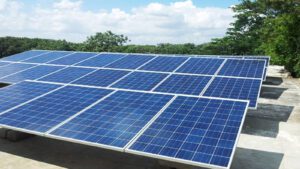How to Save Electricity for Your Warehouse in Singapore

As the cost of electricity continues to rise, businesses are looking for ways to reduce their energy consumption and save money. One way to achieve this is by implementing energy-saving measures in your warehouse. By doing so, you not only reduce your operating costs but also contribute to a more sustainable future.
In this article, we will discuss some practical steps you can take to save electricity for your warehouse in Singapore. From conducting an energy audit to implementing energy-saving practices, we’ve got you covered.
Conduct an Energy Audit
The first step to saving electricity is to identify areas of high energy consumption. You can do this by conducting an energy audit. An energy audit is a comprehensive review of your warehouse’s energy consumption patterns. It involves analyzing your energy bills, identifying areas of high consumption, and proposing solutions to reduce your energy consumption.
Hiring a Professional Auditor
To conduct an energy audit, you can hire a professional auditor. The auditor will have the necessary equipment and expertise to identify areas of high energy consumption. They will also provide you with a report detailing their findings and recommendations.
Using Energy Tracking Tools
Another way to conduct an energy audit is to use energy tracking tools. These tools can monitor your energy consumption in real-time and provide you with detailed reports on your energy usage. Some popular energy tracking tools include:
- Energy Star Portfolio Manager: A free tool that helps you track your energy consumption, set energy-saving goals, and benchmark your energy usage against similar warehouses.
- BuildingOS: A cloud-based energy management platform that helps you track your energy usage, identify areas of high consumption, and automate energy-saving measures.
Optimize Lighting
Lighting is one of the most significant contributors to electricity consumption in warehouses. By optimizing your lighting, you can significantly reduce your energy consumption.
Replace Traditional Lighting with LED Bulbs
One way to optimize lighting is to replace traditional lighting with LED bulbs. LED bulbs are more energy-efficient than traditional bulbs and can last up to 25 times longer. They also emit less heat, which reduces the load on your air conditioning system.
Install Motion Sensors
Another way to optimize lighting is to install motion sensors. Motion sensors can detect when someone is present in a room and turn on the lights automatically. When no one is present, they turn off the lights. This ensures that lights are only on when they are needed, reducing energy waste.
Use Natural Lighting
Using natural lighting during the day is another way to optimize lighting. If your warehouse has windows or skylights, make use of them to reduce your reliance on artificial lighting.
Clean Lighting Fixtures
Finally, ensure that your lighting fixtures are clean and dust-free. Dirty fixtures can reduce the amount of light emitted and increase energy consumption.
Upgrade to Energy-Efficient Equipment
Upgrading to energy-efficient equipment is another way to save electricity in your warehouse. Energy-efficient equipment uses less electricity to operate and can save you significant amounts on your energy bills.
Replace Old Equipment
Replace old equipment with energy-efficient models. Old equipment tends to use more electricity than newer models. For example, replacing an old air conditioner with a newer, energy-efficient model can save you up to 50% on your cooling costs.
Use Programmable Thermostats
Use programmable thermostats to control heating and cooling. Programmable thermostats allow you to set specific temperatures for different times of the day. For example, you can set the thermostat to turn off the air conditioner during non-business hours to save energy.
Ensure All Equipment is Properly Maintained
Ensure all equipment is properly maintained to ensure it operates at peak efficiency. Regular maintenance can also prevent breakdowns and extend the lifespan of your equipment. Some maintenance tasks to consider include:
- Regularly cleaning or replacing air filters in air conditioning units
- Inspecting and repairing any leaks in air conditioning or heating ducts
- Lubricating moving parts in machinery to reduce friction and energy consumption
Improve Insulation and Ventilation
Insufficient insulation and poor ventilation can result in significant energy waste in your warehouse. By improving insulation and ventilation, you can reduce your energy consumption and improve indoor air quality.
Insulate Your Warehouse
Insulate your warehouse to reduce heat loss during the winter and heat gain during the summer. Insulation helps to maintain a consistent temperature, reducing the need for heating and cooling.
Improve Ventilation
Improving ventilation can also reduce your energy consumption. Proper ventilation helps to regulate indoor air quality and temperature, reducing the need for heating and cooling. Consider installing ventilation fans or improving natural ventilation to improve air circulation.
Implement Energy-Saving Practices
Implementing energy-saving practices is another effective way to save electricity in your warehouse. By making simple changes in your daily operations, you can significantly reduce your energy consumption.
Encourage Energy-Saving Behaviors
Encourage your employees to adopt energy-saving behaviors. For example, remind them to turn off lights and equipment when not in use, and encourage them to use natural light when possible.
Implement a Energy Management Plan
Implement an energy management plan to ensure that energy-saving practices are being followed. An energy management plan sets out specific goals and strategies to reduce energy consumption and ensures that everyone in the organization is working towards the same goal.
Conduct Regular Energy Audits
Regularly conduct energy audits to track your progress and identify areas for improvement. This helps you to stay on track and adjust your energy-saving strategies as needed.
Solar Panel For Your Business

Solar panels can provide significant benefits for businesses looking to save on electricity costs and reduce their carbon footprint. Here are some of the ways that solar panels can help businesses save electricity:
- Generating electricity: Solar panels convert sunlight into electricity, which can be used to power your business. By using solar energy instead of electricity from the grid, your business can significantly reduce its electricity bills. The more electricity your solar panels generate, the less you need to purchase from the grid, which can result in significant savings over time.
- Net metering: Net metering is a program that allows businesses to receive credit for any excess electricity generated by their solar panels. This means that during times when your solar panels produce more electricity than your business needs, the excess electricity can be fed back into the grid and you can receive credits that can be used to offset your electricity bills. In some cases, businesses can even receive a check from their utility company for the excess electricity they generate.
If you would like to install solar panel for your business you can contact us here.
Conclusion
Saving electricity in your warehouse is an achievable goal that can lead to significant cost savings and a more sustainable future. By conducting an energy audit, optimizing lighting, upgrading to energy-efficient equipment, improving insulation and ventilation, and implementing energy-saving practices, you can significantly reduce your energy consumption and contribute to a more sustainable future.
Remember to regularly monitor your energy consumption and track your progress to ensure that your efforts are paying off. By working together, we can make a positive impact on the environment and save money in the process.
